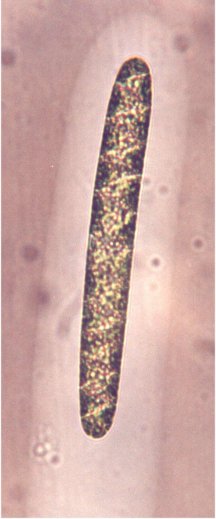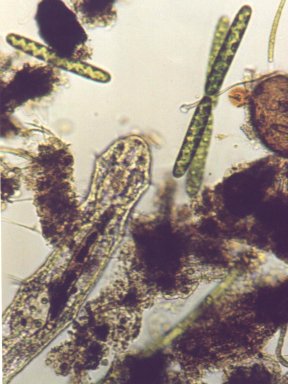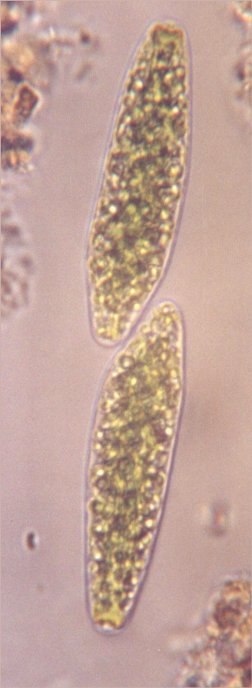
Figure a)
Fig. a) is 208µm long 25µm broad. Fig. b) are about 21µm long 22µm broad; a & b have been photographed with Indian ink added to the water to show the mucilage. |

Figure b) |
|
The Desmid Genus Spirotaenia.
by William Ells, UK |
There are ten species of the genus listed in A CHECK-LIST OF DESMIDS OF THE BRITISH ISLES. The species most likely to be found which is widespread throughout Britain although not very common is Spirotaenia condensata (Bréb) Ralfs 1848. This species, like most others in the genus, is usually found enclosed in a mucilaginous sheath and has a parietal (attached or near to walls) spiral chloroplast.

Figure a)
Fig. a) is 208µm long 25µm broad. Fig. b) are about 21µm long 22µm broad; a & b have been photographed with Indian ink added to the water to show the mucilage. |

Figure b) |
| Fig. c) shows five specimens being approached by an oligochaete worm which has already swallowed a desmid of the Closterium genus. Figs. a) & b) came from a small pool on Dartmoor in 1997. Fig c) came from a bog in Scotland in 1991. |

Figure c) |
| Fig. d) Spirotaenia alpina
Schmidle 1895.
These were also enclosed in mucilage,
the spiral chloroplast is axile (arranged around a central axis). The species
has a small reddish area in each apex of a fully developed cell, one can
be seen in the photograph. The cells are about 71µm long and
18µm broad. Photo’ taken 1992 in a sample from an acid habitat in
Scotland. Prof. A. J. Brook (1997) proposed a new genus Polytaenia
to include this species. This was later abandoned as the name Polytaenia
already existed for a flowering plant. Therefore a new name was proposed
Tortitaenia
Brook 1998.
|

Figure d) |
All comments to the author W H Ells are welcomed.
References:-Brook A.J. & Williamson D.B. 1991. A CHECK-LIST OF DESMIDS OF THE BRITISH ISLES, Freshwater Biological Association. Occasional Publication No.28.
Brook A.J. 1997. The proposed establishment of a new desmid genus Polytaenia, Quekett Journal of Microscopy, Vol.38, Part 1, p7.
Brook A.J. 1998. Short Note, Quekett Journal of Microscopy, Vol. 38, Part 2, p146.
Please report any Web problems or
offer general comments to the
Micscape
Editor,
via the contact on current Micscape
Index.
Micscape is the on-line monthly magazine
of the Microscopy UK web
site at Microscopy-UK